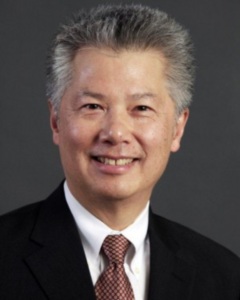AAPI Heritage Month: Interview with Board of Directors Chairperson Bill Lann Lee
May 24, 2021

May 24, 2021
Advancement Project has an inspired team of organizers, lawyers, dreamers and thinkers fighting for racial justice. One of our many contributors to the Movement is the Chairperson of our Board of Directors, Bill Lann Lee, who has had a distinguished legal career as a civil rights lawyer and advocate. Have you ever wanted to know more about the real people behind the work we do? Read on for an inspiring interview we had with Mr. Lee.
Advancement Project National Office: You’ve had quite a journey from a working-class immigrant household in New York City to a long career in civil rights law, politics, and nonprofit work. How did your upbringing inform the racial justice work you’re known for today?
Bill Lann Lee: My father, William Lee, was a poor Chinese laundryman and restaurant worker. He came to the country as an undocumented immigrant because Chinese were barred by immigration law from entering our country because of race.
Although my father was mistreated in many ways in New York in the 1930s, he volunteered to fight in the U.S. Army in the Pacific after Pearl Harbor was bombed at the beginning of WWII. He made sergeant in a unit with white teenagers and young men from impoverished Oklahoma, many of whom were killed. He bonded with the men in his unit and felt for the first time in America that he was treated as an equal in the hard fighting in the jungles of New Guinea.
Like other minority veterans, he fought to defend a democracy that denied him many of the rights he was he was fighting for. I learned from him that we have an obligation to make the country live up to its ideals. It was at the heart of his patriotism.
 Bill Lann Lee
Bill Lann Lee
AP: You have spent your career as a staunch advocate for civil rights and racial justice, including unapologetically advocating for affirmative action and police reform. How has the racial justice landscape changed during your career?
BLL: As a young lawyer for the NAACP Legal Defense Fund, beginning in the 1970s, I brought civil rights cases to win Black Americans their legal rights on the job, in school and buying homes. The justice landscape has changed as civil rights lawyers have focused more on working with community organizers to identify the goals of local communities of color and to structure cases and legal remedies to meet community needs like police reform and protecting voting rights. Advancement Project’s model of community lawyering is what many lawyers now emulate.
Also, there is a more public discussion of racism, especially structural racism, and a broader multi-racial coalition fighting to end it.
AP: How has it stayed the same?
BLL: The needs of communities of color have stayed the same: community security, voter protection, education equity, employment opportunity, fair housing. As the courts change, lawyers have to represent clients in ethical, sensitive and smart ways keeping their eyes on the prize. Being in sync with community organizers and what the community needs is key now.
AP: You spent many years of your civil rights career in Los Angeles, where you sued the Los Angeles Police Department several times. You were there when Rodney King was brutally beaten and years later as Assistant Attorney General for Civil Rights, you opened an investigation into LAPD that resulted in DOJ oversight of reforms. Last summer, we saw mass mobilizations for months demanding change. What lessons did you learn that would help lawyers and organizers today?
BLL: Community lawyering is not for the faint-hearted. We are playing the long game as are communities of color. Communities appreciate not only our lawyering skills sincerity, honesty and a laser focus on their needs.
AP: We’ve seen an increase in hate crimes against the AAPI community in the recent year. We’ve seen these upticks before including in the late 1990s. What’s causing it now? What should be the response?
BLL: Hate crimes and violence unfortunately have a long history for Asian Americans and for others. When I was head of the Civil Rights Division of the U.S. Department of Justice in the late 1990s, we investigated and prosecuted hate crimes against Asian Americans, African Americans, Latinxs, Jews, women, and LGBT people. One case involved a gunman who was trying to kill Jewish schoolchildren; when his plans to shoot up their school did not pan out, he killed an Asian American mail carrier who happened by. In addition, the Civil Rights Division back then had a unit that just investigated bombing and burning of Black churches and Jewish synagogues.
The difference today is that for four years, President Trump legitimized and incited hatred and violence against people of color and never condemned them, much less investigated or prosecuted, the perpetrators. Putting the weight of our national government behind hate makes it so much harder to eradicate even when a new Administration is in place.
Our response should be to condemn white supremacy, acts of violence against specific targeted groups and condemn acts even when they involve victims who do not look or speak like us.
AP: What keeps you hopeful about racial justice?
BLL: I agree with Dad, that the ideals of our nation can be realized if we work and support each other. We need to continue the fight our predecessors fought.
AP: What are you reading now?
BLL: I just finished Implacable Foes, about the WWII island hopping in the Pacific and just started a book about the New Deal, Fear Itself. My Dad was a big supporter of the ideals of the New Deal.